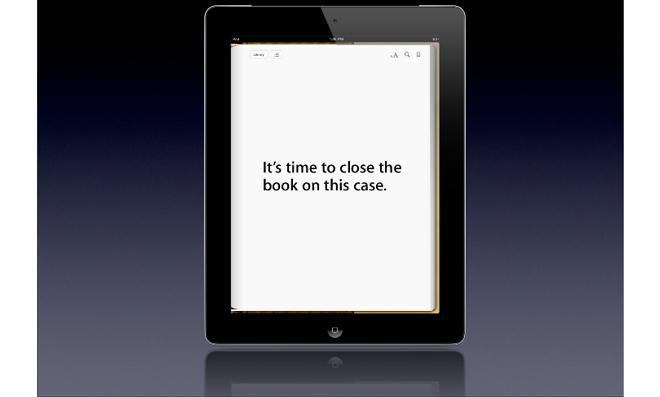The U.S. government has succeeded in its federal antitrust suit against Apple, as the judge presiding over the case has determined that Apple conspired with book publishers to raise the price of e-books.
The decision was handed down by U.S. District Judge Denise Cote in Manhattan on Wednesday. Damages levied against Apple are to follow in a separate trial.
"The question in this case has always been a narrow one: whether Apple participated in a price-fixing scheme in violation of this country's antitrust laws," Cote wrote. "Apple is liable here for facilitating and encouraging the Publisher Defendants' collective, illegal restraint of trade.
"Through their conspiracy they forced Amazon (and other resellers) to relinquish pricing authority and they raised retail e-book prices. Those higher prices were not the result of regular market forces but of a scheme in which Apple was a full participant."
Cote also dismissed the possibility that her ruling will stifle competition in the e-book market. She said her ruling is based solely on events that occurred as Apple entered the e-book market, and she does not "seek to paint with a broader brush."
Closing arguments were presented in the trial last month, on June 20. In its case, the government accused Apple of colluding with five major book publishers to falsely inflate the prices of e-books sold on the iBookstore.
Apple, for its part, denied the charges, and remained steadfast in opposition even as all five book publishers reached out-of-court settlements with the government.
Apple led the charge in convincing publishers to switch to a so-called "agency" pricing model. That prevented content owners from being able to sell the same titles at a lower price elsewhere, without offering the same price on Apple's iBooks platform.
In contrast, the e-book industry prior to the launch of the first iPad was under the "wholesale model" preferred by market leader Amazon. In that model, resellers such as Amazon had the power to set prices, selling titles at or below cost if they chose to do so.
 AppleInsider Staff
AppleInsider Staff














 William Gallagher
William Gallagher
 Christine McKee
Christine McKee

 Chip Loder
Chip Loder

 Malcolm Owen
Malcolm Owen










163 Comments
Bullshit! The governments case was so damn weak. It was all basically disproved as Apple had negotiated significantly different contracts with the publishers. Can they appeal this?
Now that's a surprise considering how Apple's lawyer pretty much dismantled every witness the FTC brought up. I guess the judge is a big Orwell fan where even an e-mail draft (or thought) is good enough to convict.
That closing slide is too funny!
Surprise surprise. The government ruling for themselves. This was going to happen regardless of any evidence Apple presented. One way or another the government will get those tax dollars from Apple.
No big surprise since the judge basically admitted the whole thing was a show trial early on. It's a case of the DOJ choosing sides in a spat between two big businesses (and the one that had 90% market share on top of it).